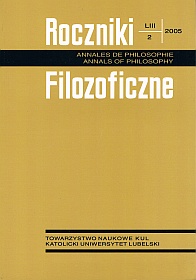„Adaequatio intellectus et rei” in the Light of the Discussion with Semantic Skepticism
Abstract
The article juxtaposes modern skepticism stating lack of the criterion of true beliefs about transcendent reality with respect to their contents, but accepting the assumption about existence and cognoscibility of those contents on the one hand, and — after M. F. Burnyeat — ancient skepticism understood as one that questions this assumption on the other. The doubt as to existence of beliefs — resp. propositions as contents of beliefs — is a link joining ancient skeptics with Wittgenstein. Their skepticism is not – as modern skepticism – an epistemological position, but an ontological one — nominalism — questioning existence of universals that are the conditions of meaning and hence the conditions of truth of propositions. This is why the ancient dispute concerning the truth was in fact a dispute over the problem of universals, i.e. over existence of constant rules deciding which ways of connecting the subject and the predicate in a proposition are right and which are not. Realists referred to such rules, sophists denied their existence, and skeptics stated that without having such a rule at their disposal they do not have a basis for deciding the dispute between realists and sophists. This does not have much to do either with so-called correspondence concept of the truth or with the modern understanding of conceptual realism talking about “ideal paradigms” or “common properties” of things. Today’s typologies of philosophical positions do not fit antiquity. Ch. S. Peirce’s and D. Armstrong’s arguments lead to the conclusion that Plato was a… nominalist in the modern meaning of the world. P. T. Geach’s and N. Wolterstorff’s analyses allow stating the same about St Thomas Aquinas. This places under the question mark the statement that the latter could be an advocate of the generally ascribed to him correspondence theory of truth, which also cannot be derived from Aristotle’s philosophy without any doubts.
References
Ajdukiewicz K.: Zagadnienia i kierunki filozofii. Teoria poznania. Metafizyka, Aletheia, Kęty: Wyd. Antyk 2002.
Arendt H.: Co to jest wolność? [w:] Między czasem minionym a przyszłym, przeł. M. Godyń, W. Madej, Warszawa: Aletheia 1994, s. 15-28.
Armstrong D. M.: Universals and Scientific Realism, t. I: Nominalism and Realism, London: Cambridge University Press 1978.
Arystoteles: Kategorie. Hermeneutyka, przeł. K. Leśniak, Warszawa: PWN 1975. Biblioteka Klasyków Filozofii.
Arystoteles: Metafizyka, przeł. K. Leśniak, Warszawa: PWN 1983. Biblioteka Klasyków Filozofii.
Baker G. P., Hacker P. M. S.: Scepticism, Rules and Language, Oxford: Blackwell 1984.
Boghossian P.A.: The Rule-Following Considerations, „Mind”, vol. 98, nr 392 (October 1989), s. 141-187.
Campbell R.: Truth and Historicity, Oxford: Clarendon Press 1992.
Cherniss H.: The Relation of the Timaeus to Plato’s Later Dialogues, [w:] Studies in Plato’s Metaphysics, ed. R.E. Allen, London 1965.
Crivelli P.: Aristotle on Truth, Cambridge: Cambridge University Press 2004.
Dąmbska I.: Sceptycyzm francuski XVI i XVII wieku, Toruń: PWN 1958.
Fine G.: Descartes and Ancient Skepticism: Reheated Cabbage?, „The Philosophical Review”, vol. 109, nr 2 (April 2000), s. 195-234.
Geach P. T.: Akwinata [w:] G. E. M. Anscombe, P. T. Geach, Trzej filozofowie, przeł. B. Chwedeńczuk, Warszawa: Instytut Wydawniczy PAX 1981, s. 89-154.
Głód B.: Problem istnienia i poznawalności faktów semantycznych w świetle sceptycznej argumentacji Kripkego, „Kwartalnik Filozoficzny”, 31 (2003), nr 2, s. 85-106.
Heidegger M.: Bycie i czas, przeł. B. Baran, Warszawa: Wydawnictwo Naukowe PWN 1994.
Ingarden R.: Studia z estetyki, t. I, wyd. 2, Warszawa: PWN 1966.
Judycki S.: O klasycznym pojęciu prawdy, „Roczniki Filozoficzne” 49 (2001), z. 1, s. 25-62.
Kahn C. H.: The Verb «Be» in Ancient Greek, Foundations of Language, Suppl. Series 16, Dordrecht: Reidel 1973.
Kripke S.: Wittgenstein on Rules and Private Language, Oxford: Blackwell 1982.
Łukasiewicz J.: O zasadzie sprzeczności u Arystotelesa, Warszawa: PWN 1987.
Millikan R.: Truth Rules, Hoverflies, and the Kripke-Wittgenstein Paradox [w:] Rule-Following and Meaning, ed. A. Miller, C. Wright, Ithaca: McGill-Queen’s University Press 2002, s. 209-233.
Papineau D.: Reality and Representation, Oxford: Blackwell 1987.
Peirce Ch. S.: Recenzja „Dzieł” Berkeleya (Oxford 1871) [fragment], przeł. R. Mirek, [w:] Wybór pism semiotycznych, przeł. A. Nowak i R. Mirek, red. H. Buczyńska-Garewicz, Warszawa 1997, s. 11-37. Biblioteka Myśli Semiotycznej.
Pfeiffer W. M.: True and False Speech in Plato’s „Cratylus” 385b-c, „Canadian Journal of Philosophy” 2 (1972), s. 87-104.
Platon: Kratylos, przeł. W. Stefański, Wrocław: Ossolineum 1990.
Platon: Państwo, przeł. W. Witwicki, t. I-II, Warszawa: PWN 1958.
Platon: Sofista. Polityk, przeł. W. Witwicki, Warszawa: PWN 1956. Biblioteka Klasyków Filozofii.
Sextus Empirikus: Zarysów Pirrońskich Księga Pierwsza, Druga i Trzecia, przeł. A. Krokiewicz, Kraków: Nakładem PAU 1931.
Tatarkiewicz W.: Historia filozofii, t. I, wyd. VI, Warszawa: PWN 1968.
Tomasz z Akwinu, Byt i istota, [w:] M. Krąpiec, Byt i istota. Św. Tomasza „De ente et essentia”. Przekład i komentarz, Lublin: RW KUL 1994.
Wesoły M.: Arystotelesowska koncepcja prawdy, „Studia Filozoficzne” 1983, nr 1-2, s. 17-48.
Wittgenstein L.: Philosophical Investigations, Oxford: Blackwell 1953; polski przekład: Dociekania filozoficzne, przeł. B. Wolniewicz, Warszawa: PWN 1972.
Woleński J.: Metamatematyka a epistemologia, Warszawa: Wydawnictwo Naukowe PWN 1993.
Wolterstorff N.: On Universals. An Essay on Ontology, Chicago: The University of Chicago Press 1970.
Zalabardo J.: Kripke’s Normativity Argument [w:] Rule-Following and Meaning, ed. A. Miller, C. Wright, Ithaca: McGill-Queen’s University Press 2002, s. 274-293.
Copyright (c) 2005 Roczniki Filozoficzne

This work is licensed under a Creative Commons Attribution-NonCommercial-NoDerivatives 4.0 International License.





